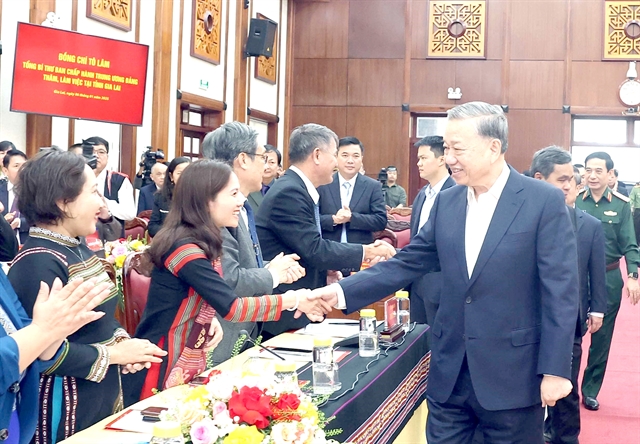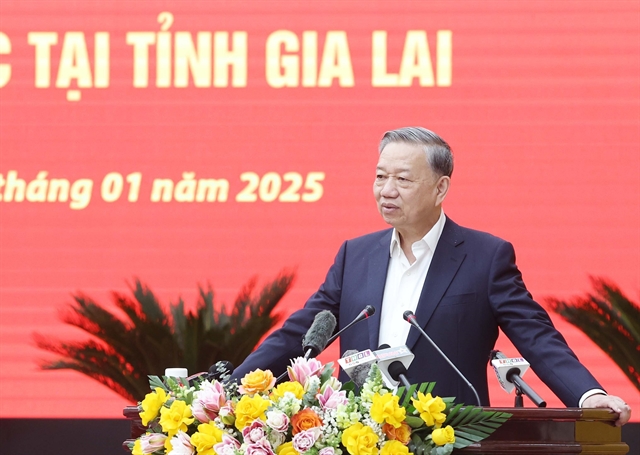 Economy
Economy

 |
| Party General Secretary Tô Lâm meets with representatives in the Central Highlands province of Gia Lai on Monday. — VNA/VNS Photo Thống Nhất |
GIA LAI — The Central Highlands province of Gia Lai needs to demonstrate a strong commitment to development in order to become a prosperous province.
The province, in the central coastal and highlands region, needs to focus on organic agriculture, ecological diversity, rich and distinctive cultural assets as well as sustainable social and environmental practices.
Efforts should be made to accelerate development and improve the quality of life for its residents.
Party General Secretary Tô Lâm made the orders on Monday during his working session with Gia Lai Province on the results of implementing the Resolution of the 13th National Party Congress and the 16th Provincial Party Congress.
In his address, Lâm urged the province to closely follow the Central Party’s Resolutions, approved planning, and strategies for comprehensive, in-depth, and inclusive economic development based on three main pillars.
The three pillars consisted of developing high-tech, sustainable, and organic agriculture, developing selected industries that capitalise on the province's comparative advantages, such as processing industries, renewable energy, and construction materials, and growing tourism as a green economy sector. Tourism is a key economic driver, with distinctive quality, sustainable practices, and a unique identity reflecting the Central Highlands region.
Lâm said that the province must significantly improve the investment environment, making business operations transparent, convenient, and cost-effective to effectively implement the pillars.
The province should make efforts to boost the digital economy and innovation and enhance transport infrastructure linking urban areas, economic hubs, and raw material zones, as well as irrigation, industrial, and tourism infrastructure.
The province was instructed to strongly promote private-sector economic growth and rapidly increase its contribution to the provincial Gross Regional Domestic Product (GRDP).
Successful collective economic models, such as new-style cooperatives and agricultural associations, should be expanded, and local OCOP (One Commune—One Product) initiatives should be enhanced.
It was also important to improve the efficiency and competitiveness of State-owned enterprises and remove barriers hindering the private sector’s growth.
The province was tasked with focusing on the effective implementation of three national target programmes: building new-style rural areas, reducing poverty sustainably, and developing the socio-economic conditions of ethnic minorities and mountainous regions.
He also urged swift and comprehensive reviews of targets, tasks and solutions, addressing bottlenecks to development and striving to achieve the highest possible level of goals set in the 16th Provincial Party Congress Resolution.
A key area of focus, according to Lâm, was the building of a clean and strong Party and political system capable of responding to new challenges.
It included a comprehensive review of the implementation of Resolution 18 regarding the reorganisation of political apparatus.
Strengthening national defence
 |
| Party General Secretary Tô Lâm delivers his speech at a meeting in the Central Highlands province of Gia Lai on Monday.—VMA/VNS Photo Thống Nhất |
Lâm also stressed the need to strengthen national defence, security and foreign relations, treating those as permanent and high-priority tasks.
“The Central Highlands, including Gia Lai Province, holds a crucial position in national security and defence,” he said.
Economic development must be closely linked to safeguarding national sovereignty, border security, and the effective prevention of cross-border crimes and smuggling.
“Provincial authorities had to remain vigilant against hostile forces and actively protect internal political security, religious security, economic security, cyber security and State secrets,” he added.
Maintaining strong ties with neighbouring border provinces was believed to be vital for fostering regional economic development and promoting peaceful, cooperative and friendly relations.
He assigned relevant ministries and agencies to consider and address the province's proposals in accordance with legal frameworks, ensuring maximum support for the province's development potential.
He said he believed that the province would make significant breakthroughs in socio-economic development, laying a solid foundation for rapid, sustainable and comprehensive growth, with improved living standards for its people, enabling them to thrive in tandem with the nation’s advancement into a prosperous future.
Following a report at the meeting, in the 2020-25 period, the province’s economic growth rate is expected to average 6.21 per cent, with the economy growing nearly 1.9 times compared to the beginning of the term.
Agriculture, forestry and fisheries play a crucial role, with a focus on applying scientific technology to increase productivity and value.
Key agricultural products, including coffee, pepper, rubber and cassava, have become important export items.
The forest coverage rate is substantial at 47.5 per cent.
Industrial and construction output has also seen strong growth, and the province has attracted significant renewable energy projects.
Human resource training, employment and healthcare have made notable progress, helping improve labour quality.
The health system and network have been boosted, extending to remote villages.
The poverty rate has significantly reduced thanks to Government support policies.
The National Target Programme on building new-style rural areas has transformed rural areas, providing opportunities for socio-economic development and improving both material and spiritual well-being.
On the occasion of the meeting, Lâm presented a VNĐ5 billion ($196,600) health station to Glar Commune in Đak Đoa District, aimed at enhancing the healthcare quality for local residents.— VNS